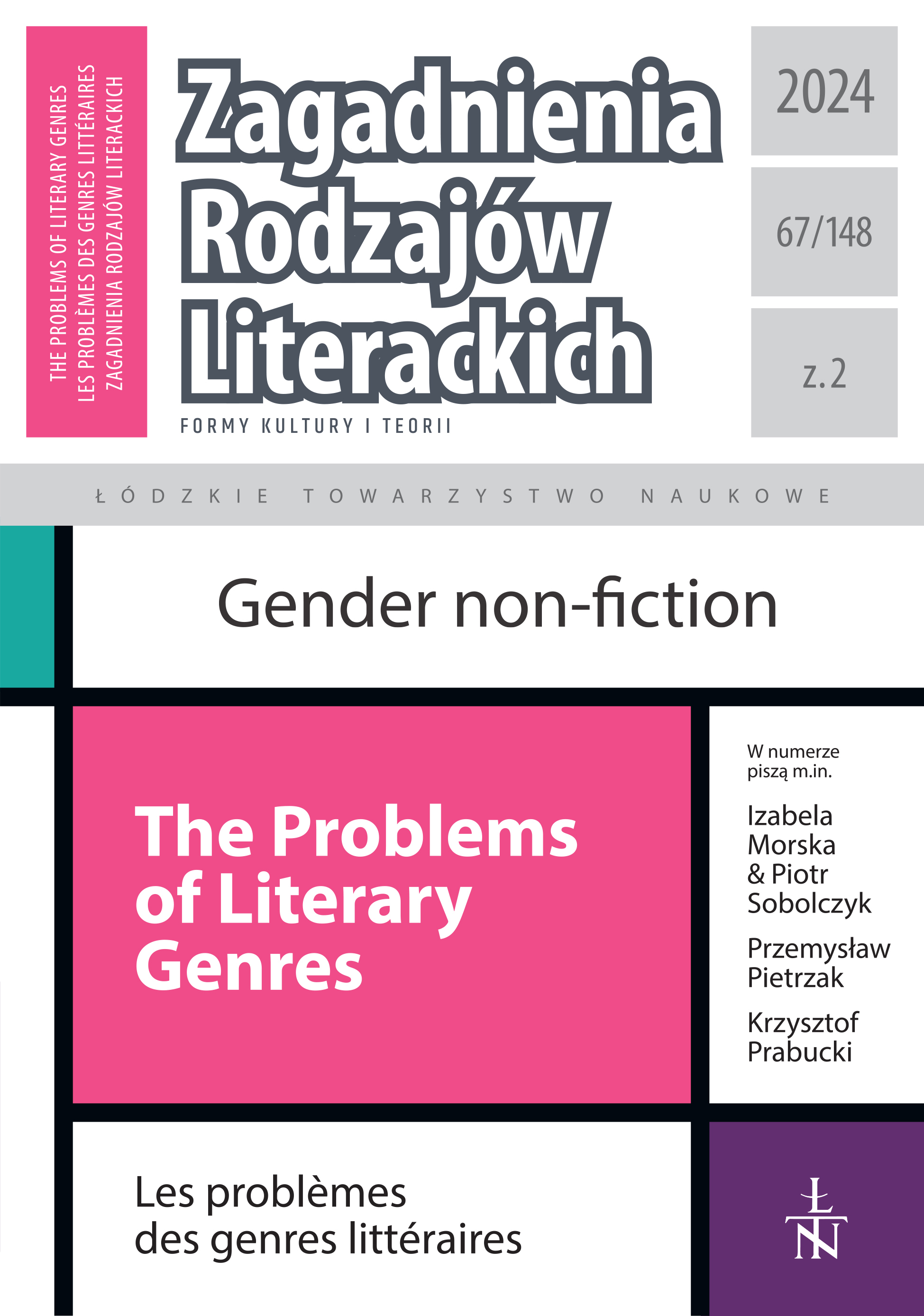Autobiograficzne poradniki i poradnikowe teksty autobiograficzne — o „zmąconych” wariantach „niebinarnej” prozy non-fiction
DOI:
https://doi.org/10.26485/ZRL/2024/67.2/17Słowa kluczowe:
nonbinary; autobiographical prose; self-help guide; queer literature; genologyAbstrakt
The aim of this article is to present a variant of nonbinary non-fiction prose and the genological matter related to it. Recently, the topic of nonbinary gender identities has become increasingly popular, and more and more cultural texts devoted to it are being published. Despite this, Polish literary studies lack a deeper theoretical reflection on these issues. Perhaps this is due to the sparse representation of non-fiction books devoted to non-binarity on the Polish publishing market and the rather recent emergence of this topic in wider social debates. For this reason, the subject of analysis will be mostly contemporary books written in English — self-help guidebooks and autobiographical prose. In these pieces one notices a mix of conventions of genology. Guidebooks contain autobiographical elements, while autobiographical prose feature elements similar to guides (for example advice is given, phrases are addressed to the reader) and are treated as such by the audience. This may be related to the socially engaged character of these texts (aimed at improving the situation of nonbinary people in society), which combine collective elements with experiences of individuals. Referring to, among others, the works of Eve Kosofsky-Sedgwick, Katarzyna Trzeciak, Stanisław Balbus and Romuald Cudak, the article seeks to show the relationship between the “blurring” of these texts and their queer, community-oriented nature.
Liczba pobrań
Bibliografia
Balbus Stanisław (1999), „Zagłada gatunków”, „Teksty Drugie” nr 6.
Blackburn Mollie V., Clark Caroline T., Nemeth Emily A. (2015), Examining Queer Elements and Ideologies in LGBT Themed Literature: What Queer Literature Can Offer Young Adult
Readers, „Journal of Literacy Research” nr 47(1), DOI: 10.1177/1086296X15568930.
Cała siła, jaką czerpię na życie. Świadectwa, relacje, pamiętniki osób LGBTQ+ w Polsce (2022), red. J. Bednarek, P. Laskowski, S. Matuszewski, Ł. Mikołajewski, M. Sobczak, Karakter, Kraków.
Chwin Stefan, Rosiek Stanisław (1981), Bez autorytetu, Wydawnictwo Morskie, Gdańsk.
Cudak Romuald (2015), Gatunek literacki i granice: rozważania pograniczne [w:] Gatunki mowy i ich ewolucja, t. 5: Gatunek a granice, red. D. Ostaszewska, J. Przyklenk, Wydawnictwo
Uniwersytetu Śląskiego, Katowice, rebus.us.edu.pl/bitstream/20.500.12128/1188/4/
Cudak_Gatunek_literacki_i_granice.pdf [dostęp: 5.10.2024].
Czermińska Małgorzata (2020), Autobiograficzny trójkąt. Świadectwo, wyznanie, wyzwanie, TAiWPN Universitas, Kraków.
Encyklopedia gender (2014), red. M. Rudaś-Grodzka, K. Nadana-Sokołowska, A. Mrozik, K. Szczuka, K. Czeczot, B. Smoleń, A. Nasiłowska, E. Serafin, A. Wróbel, Czarna Owca,
Warszawa.
Ficek Ewa (2013), Poradnik: model gatunkowy i jego tekstowe aktualizacje, Wydawnictwo Uniwersytetu Śląskiego, Katowice.
Fras Janina (2012), Podstawy identyfikacji i typologii wypowiedzi w mediach masowych [w:] Komunikologia. Teoria i praktyka komunikacji, red. E. Kulczycki, M. Wendland, Wydawnictwo
Naukowe Instytutu Filozofii UAM, Poznań, HANDLE: 10593/2855.
Geertz Clifford (1990), O gatunkach zmąconych: nowe konfiguracje myśli społecznej, przeł. Z. Łapiński, „Teksty Drugie” nr 2.
Gender euphoria. Stories of joy from trans, non-binary and intersex writers (2021), red. L.K. Dale, Unbound, Londyn [e-book].
Handbook of Autobiography/Autofiction (2018), red. M. Wagner Egelhaaf, De Gruyter, Boston– Berlin.
Heath Willow (2023), 24 Essential Non-Binary Books (Fiction&Nonfiction), „Books and Bao”, booksandbao.com/non-binary-books-fiction-nonfiction [dostęp: 5.10.2024].
Hoffman-Fox Dara (2017), You and Your Gender Identity. A Guide to Discovery, Skyhorse Publishing, Nowy Jork.
Iantaffi Alex, Baker Meg-John (2019), Life isn’t binary: On Being Both, Beyond and In-Between, Jessica Kingsley Publishers, Londyn [e-book].
Iwasiów Inga (1999), Gatunki i konfesje w badaniach „gender”, „Teksty Drugie” nr 6.
Jarosiński Zbigniew (1975), Tekst użytkowy i tekst literacki w drugiej połowie XIX wieku, „Teksty” nr 4.
Kędzierska Joanna (2007), Instruktorzy życia szczęśliwego. Fenomen współczesnych poradników — wybrane aspekty, „Global Media Journal — Polish Edition” nr 1(3).
Kobabe Maia (2021), Gender queer. Autobiografia, przeł. H. Brychczyński, Centrala, Londyn.
Kosofsky-Sedgwick Eve (1994), Tendencies, Routledge, Londyn.
Kosofsky-Sedgwick Eve (1999), A Dialogue on Love, Beacon, Boston.
Lejeune Philippe (1975), Pakt autobiograficzny, przeł. A.W. Labuda, „Teksty” nr 5.
Manifesto (b.r.) [hasło] [w:] Britannica, www.britannica.com/topic/manifesto [dostęp: 5.10.2024].
Nelson Maggie (2020), Argonauci, przeł. K. Gucio, Czarne, Wołowiec.
Nonbinary: Memoirs of Gender and Identity (2019), red. M. Rajunov, S. Duane, Columbia University Press, Nowy Jork.
Prawda w literaturze (2009), red. A. Tyszczyk, J. Borowski, I. Piekarski, Towarzystwo Naukowe KUL, Lublin.
Queering Translation, Translating the Queer. Theory, Practice, Activism (2018), red. B. Baer, K. Kaindl, Routledge, Nowy Jork–Londyn.
Skrzydłowska-Kalukin Katarzyna, Sokolińska Joanna (2022), Mów o mnie ono, W.A.B., Warszawa.
Skwarczyńska Stefania (1931), O pojęcie literatury stosowanej, „Pamiętnik Literacki” z. 1/4.
Tranzycja.pl (b.r.) [projekt], tranzycja.pl [dostęp: 5.10.2024].
Trzeciak Katarzyna (2018), Kto mówi? Queerowanie autobiograficzności u Eve Kosofsky Sedgwick, „Autobiografia” nr 1.
Vaid-Menon Alok (2020), Beyond the gender binary, Penguin Workshop, Londyn [e-book].
Windust Jamie (2021), In their shoes: navigating non-binary life, Jessica Kingsley Publishers, Londyn [e-book].
Young Eris (2020), They/Them/Their, Jessica Kingsley Publishers, Londyn [e-book].
Zaimki.pl (b.r.), zaimki.pl [dostęp: 5.10.2024].
Pobrania
Opublikowane
Jak cytować
Numer
Dział
Licencja
Prawa autorskie (c) 2024 Łódzkie Towarzystwo Naukowe i autorzy

Utwór dostępny jest na licencji Creative Commons Uznanie autorstwa – Użycie niekomercyjne – Bez utworów zależnych 4.0 Międzynarodowe.







